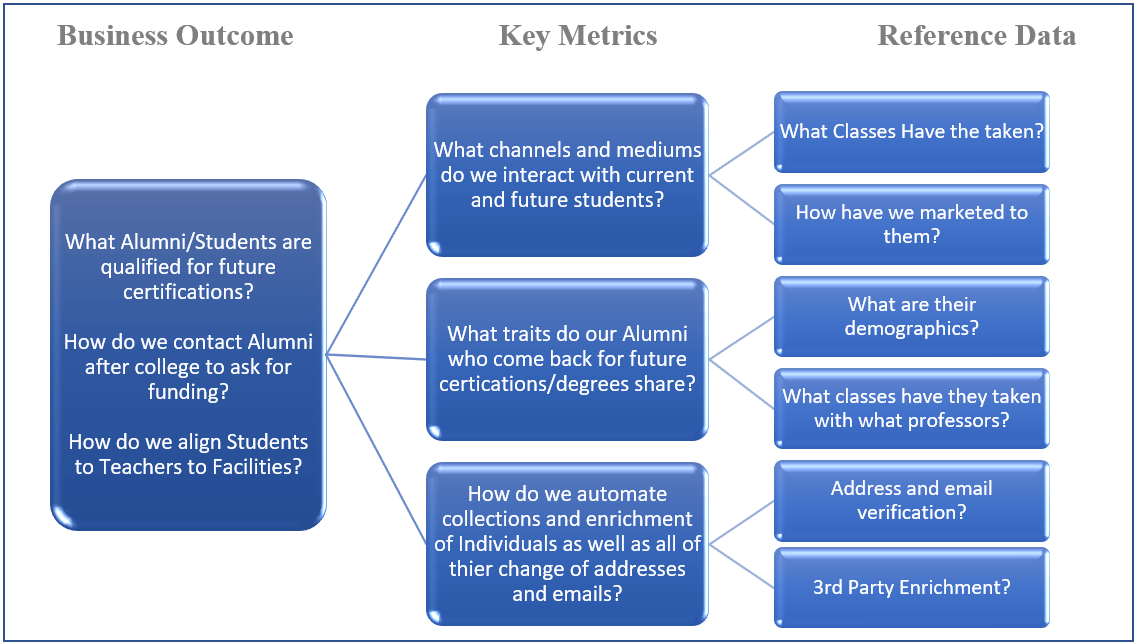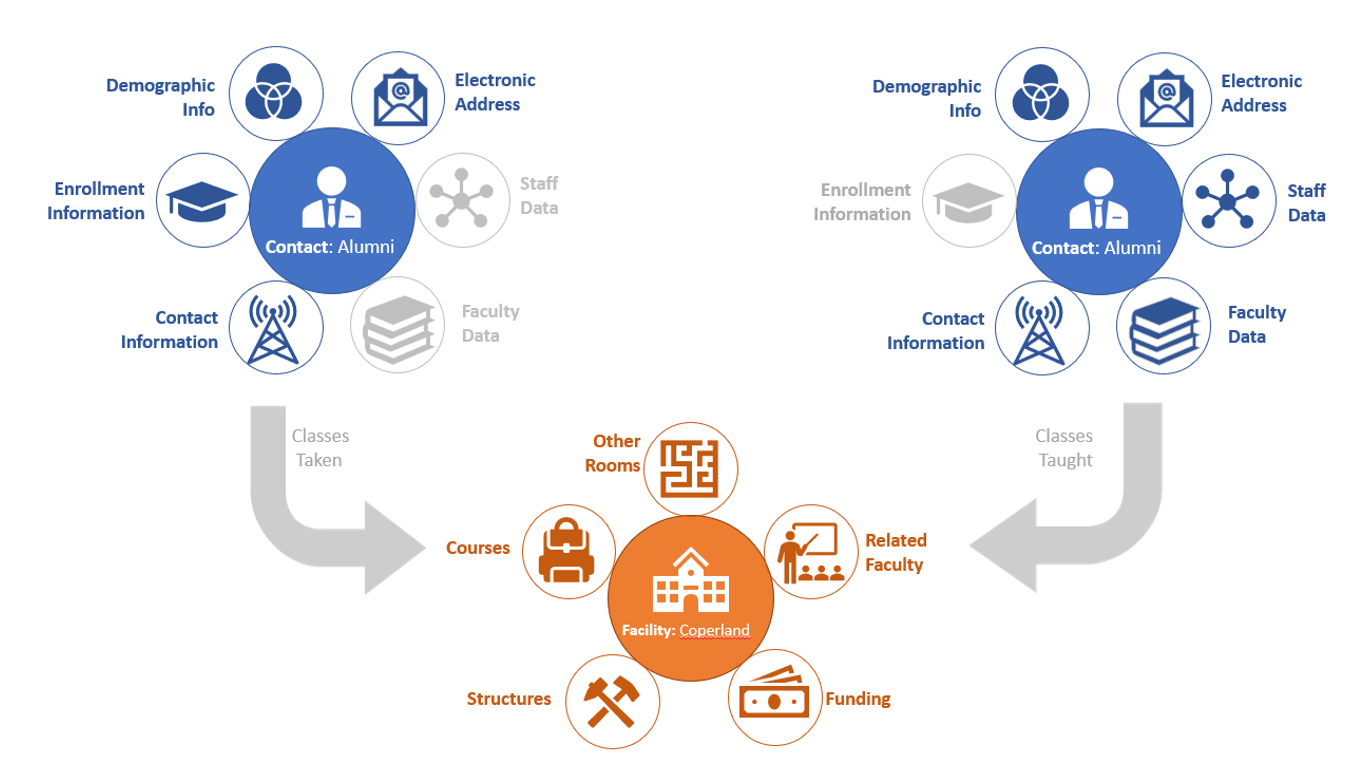Infoverity’s Express for Higher Education
Infoverity’s Express for Higher Education solution is focused around creating a more sophisticated hub of current and alumni individuals, teachers and facilities. Our primary goal is for higher education organizations to know who to market to on any campaigns including getting alumni back for extended certifications. This is done by the following:
1. Establish the business outcomes and key metrics for implementing a Higher Education Master:

2. Implement an enterprise Higher Education MDH Data Model created by Infoverity for all current and future systems to map.
One of the most important steps in establishing a Higher Education Master Data Hub is getting to know the terminology and definitions of the data. From item 1, the objective is defining the master data items, such as “Contacts” and “Facilities.” Infoverity based model for Higher Education will have extended attributes added per each college/university depending on what is found during profiling.

The goal is to only identify and an add to the Master Data Hub attributes that qualify as a master data attribute.
Master Data: The fundamental data within the higher education organization that describes substances around contacts and facilities. It can include reference data that is necessary to the overall Contact. Master data is not transactional, but it does describe transactions.
Transactional Data: Data about contact events (Students payments of classes, invoices for housing/dormitories, student card activities of accessing sporting events or access into building) that have historical significance or are needed for analysis by other systems. Transactional data are low level transactions that use master data elements.
The Infoverity model includes but not limited to standard fields around Accounts and Contacts
- Contact Names
- Facility Names
- Phone Number
- Email Address
- Multi-Address
- Alternative IDs: Social Securities
- Legacy System IDs
- Activity: Enrolled Information, Degrees
3. Establish and enforce data hygiene with higher Education standards
Data Cleansing is the process of identifying and correcting inaccurate data while moving data from a legacy system into the Higher Education Mastering Hub. The objective with data cleansing is to execute a procedure of preserving dependable and precise contact data through identification & removal of inaccurate data.
With each deployment Infoverity develops and deploys cleanse wrappers that focuses on cleansing the records. These wrappers focused high level on cleansing Email, Phone, Contact Names, Address and Facilities Names.
Questions that are asked:

- Does the data abide by the appropriate rules for its field?
- Are the characters in a name only alphabetical (Ryan Hartley) or are there numeric values in it (Ry1n Hartley)?
- Are the full name fields have singular spaces (Adam Sigg) between each word or are we seeing double spaces (Adam Sigg)?
- Does Address Line 1 and Address Line 2 have the correct part of the address in them?
- Are numeric fields have the correct lengths and formats?
- Are we seeing the correct number of digits in the phone field (10 digits in the US)?
- Are scholarship numbers fit the max values or are we see something outside expectations?
- Are social security numbers all 1s or 2s (111-11-1111)? Do they have the appropriate length to them?
- How many values are nulls? Is the number of nulls acceptable? Is there a pattern as to where there are null values?
- Are formats consistent across all rows?
- Phone Number formats
- Social Security formats
- Gender formats of (M,F,O) vs Male, Female, Others
4. Enriching data contact data with 3rd Party Systems
The right verification technology can help build a strong foundation for engagement. At Infoverity we highly suggest using 3rd party systems to help gather more demographic information about contacts as well determine any National change of Address (NCOA) and email/phone validation.
Enrich API solutions like Locate (http://Locate.com), FullContact (http://FullContact.com ) and Address Doctor (https://www.informatica.com/addressdoctor) are a few of the suggest cloud software’s where Higher Education organizations can validate addresses (Mailable? Person Still Lives there?) as well as finding out if a Phone Number or Email is active and useable.
- De-duplication of Contacts
With the right Modeling and the correct cleansing and enrichment the final step in the Master Data of Higher Education is to identify contacts: Current Students, Alumni, Future Students and faculty that are duplicates. Using primary attributes like Full Name, Email, Role Type, Phone, Address and Alternative IDs, Infoverity can create multiple use cases for matching to determine duplicates per the definition of what is a contact.
The Result – Outcomes From Implementing a Master Data Hub for Higher Education
Administrative Offices Outcomes
Administrators at college or university can connect to the Master Hub to access alumni data that support and reinforce decision-making that is strategic and that ensures the future well-being of the institution. To support decision making, administrators will have the ability access to alumni data in a few forms. The more well-known request are contact information and summary data.
Contact information, is needed for multiple purposes – from event management to fundraising to focus groups to support of academic programs.
Summary data, is needed for many purposes ranging from reporting and compliance to planning and development. Summary information should provide percentages for specific outcomes of interest (e.g., being employed, attending graduate school).
Administrators also wants to create reporting off the Master Data on alumni data that support institutional effectiveness decisions. They will have the ability to identify alumni from a specific class, pursuing a specific career role, or working in a specific industry. Within these categories, there is interest in what the data reveal about how experiences or events at the college or.
Academic Unit Leader Outcomes
Academic unit leaders will have access and control on who should be granted access to the master data hub. They want to use the centralized hub to govern and identify who is calling searches to the data as well as who is downloading data.
The second outcome is Academic leaders will have the ability to analyze the data and determine how to contact each Alumni personally for future funding and surveys around the quality of their education to the demands each Alumni is finding in the workforce.
The third outcome is the ability to seek out Alumni within an industry and market via phone, social media and email on extended courses and certifications (grad school) to continue to bring in more tuition to courses not seeked out by undergraduates as they enter the workforce year 1.
Faculty Outcomes
Faculty are highly committed to knowing and engaging their students prior to and following graduation. With an alumni master data hub, faculty will have the ability to contact alumni within the industry to better align future curriculum per the demand in the workforce with the goal of creating career-ready graduates. This alumni master hub, linked with third party accreditation standards and grant writing will allow for an expanding faculty views on what alumni need to continue to grow in the industry from continued education.
The second priority for faculty is gaining support for their efforts to access the needed data. In response to the current needs for assessing student outcomes, faculty within programs are wanting to access the data for alumni engagement within their classes. From a faculty perspective, faculty believe they will benefit from additional alumni information and employment outcomes data, especially if it positively impacts their classroom. They want to engage alumni in their classrooms through guest lectures and other activities that bring students and alumni together.
About Infoverity
Founded in 2011, Infoverity is a leading systems integrator and global professional services firm that provides MDM and PIM Strategy and Implementation, Data Governance and Analytics, Content Management, Data Integration, Enterprise Hosting and Managed Services that help large enterprises in the retail, consumer goods, manufacturing, financial and healthcare sectors to simplify and maximize the value of their information. Infoverity, a 100% employee-owned company, is on the Inc. 5000, is recognized by IDG’s Computerworld as one of the Best Places to Work in IT, as a Wonderful Workplace for Young Professionals and as a Best Place to Work by Business First. Infoverity’s global headquarters is in Dublin, Ohio, the EMEA headquarters and Global Development Center is in Valencia, Spain and additional offices are located in the United Kingdom, France, Germany, Norway and Russia. For more information on Infoverity solutions, visit Infoverity.com, follow @Infoverity on Twitter, or contact us today.
###
For more information on Mastering Data for Higher Education, please contact:
Ryan Hartley,
Managing Consultant, Customer Solutions Group, Infoverity
Rhartley@infoverity.com
or
Adam Sigg
Director, Customer Solutions Group, Infoverity
Asigg@infoverity.com
